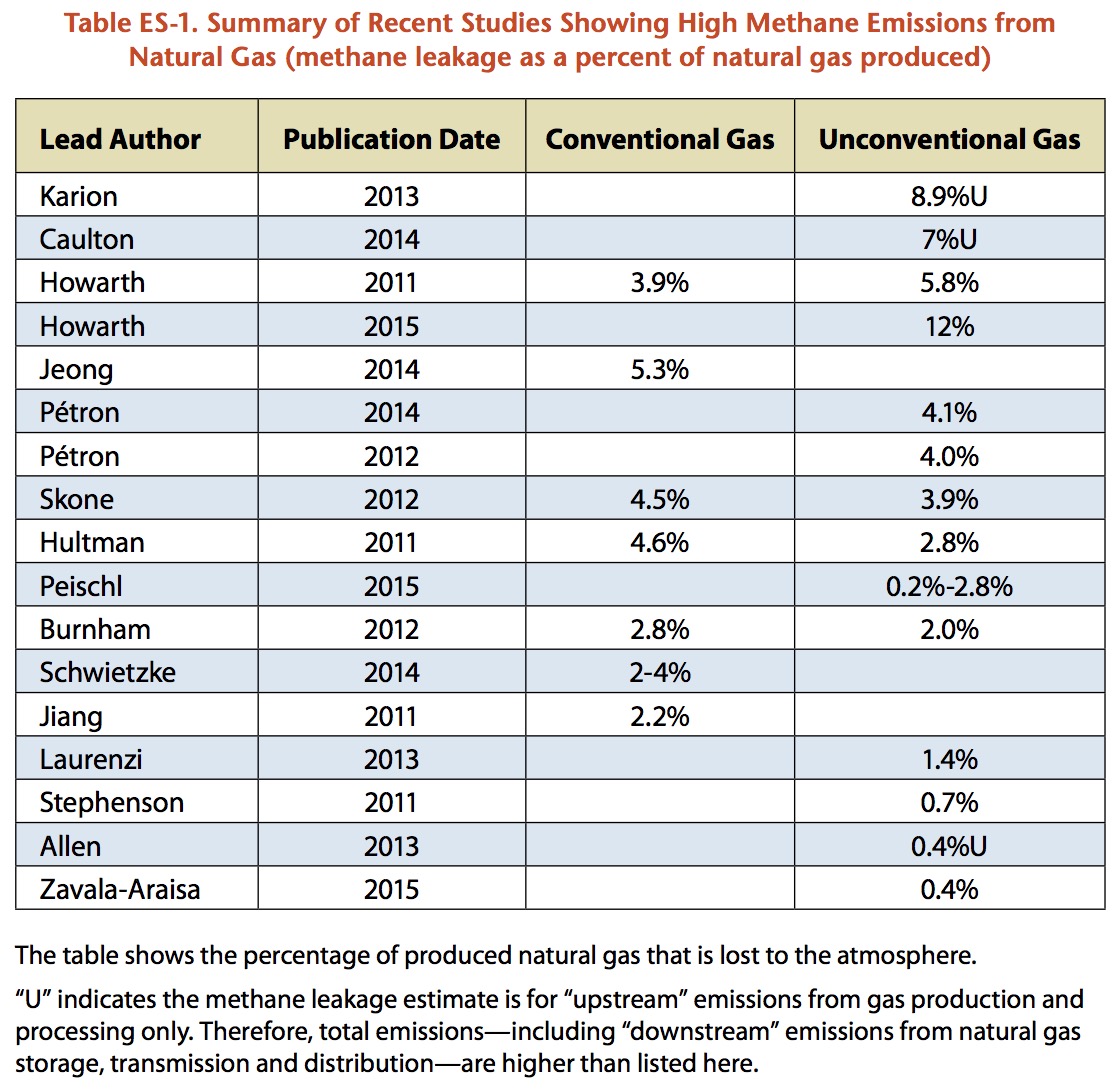ENVIRONMENT AMERICA
TOXICS ACTION CENTER
FRONTIER GROUP
 Natural gas has been touted as a “bridge fuel” that can help the United States and the world reduce emissions of global warming pollutants during the transition to truly clean sources of energy. The “bridge fuel” argument, however, hinges on a critical assumption: that the climate impacts of natural gas are modest.
Natural gas has been touted as a “bridge fuel” that can help the United States and the world reduce emissions of global warming pollutants during the transition to truly clean sources of energy. The “bridge fuel” argument, however, hinges on a critical assumption: that the climate impacts of natural gas are modest.
In recent years, a number of studies have challenged that assumption, finding that natural gas production, transportation and storage results in major leaks of methane to the atmosphere that erode or nullify the climate benefits of shifting to natural gas. These findings should lead policymakers to reject natural gas as a “bridge fuel” and instead lead them to redouble America’s efforts to repower with truly clean energy from the sun, the wind and other renewable sources of energy.
Methane is a powerful global warming pollutant.
- Methane, the primary component of natural gas, traps 86 to 105 times more heat in the atmosphere over 20 years than does the same amount of carbon dioxide. As a result, even small methane leaks during the production, processing, storage and transportation of natural gas negate its low emissions of carbon dioxide during combustion.
Multiple studies, summarized in Table ES-1 and in greater detail in this report, find high methane leakage rates from both unconventional sources of natural gas, such as shale gas produced through fracking, and from conventional sources of gas that we’ve tapped for decades.
- “Conventional gas” is produced from reservoirs trapped underground. “Unconventional gas” is trapped in porous rock such as shale or tight sands, which must be fractured to free the gas.
- Aircraft-based air sampling over Colorado’s Front Range allowed researchers from the University of Colorado (CU) Boulder, the National Oceanic and Atmospheric Administration (NOAA), and the University of California, Davis to estimate that 4.1 percent of natural gas produced in the area escapes into the atmosphere.
- In southwestern Pennsylvania, an area with extensive fracking activity, researchers from Purdue, Cornell, CU Boulder, Penn State and NOAA estimate that 7 percent of natural gas produced in the region escapes to the atmosphere.
- High methane emissions don’t occur just from natural gas obtained through fracking. A team at Carnegie Mellon has calculated that from 1985 to 1999—before the boom in high-volume hydraulic fracturing—global methane leakage rates could have been as high as 9.3 percent.
Several studies that have found a substantial global warming emission benefit from natural gas compared to other fossil fuels have used questionable assumptions or methodologies.
- A study conducted by a team from the University of Texas, Austin that found very low methane leakage rates relied on data from a small number of wells that had been selected by oil and gas companies with an incentive to minimize estimates of leakage.
- That same study drew from Environmental Protection Agency emissions estimates that have been found to greatly underestimate emissions.
- A number of analyses that show modest emissions from natural gas make overly optimistic assumptions about total lifetime gas production from each gas well, compared to data from two different federal agencies. Overestimating lifetime production lowers the calculated lifecycle emissions of electricity produced from natural gas.
The rising doubts about the climate benefits of natural gas raise the level of urgency for the United States to implement clean, renewable sources of energy—such as solar and wind power—with unambiguous benefits for the global climate. In addition, the United States should slow efforts to develop gas resources using dangerous technologies such as fracking that have major impacts on public health and the environment.
Download full version (PDF): Natural Gas and Global Warming
About Environment America
www.environmentamerica.org
“We’re a federation of state-based citizen-funded environmental advocacy organizations. When you join Environment America, you’re joining the fight to protect the places you love and advance the environmental values we share. You’re key to winning real results for our environment.”
About the Toxics Action Center
www.toxicsaction.org
Toxics Action Center’s mission is to work side-by-side with communities, providing you with the skills and resources needed to prevent or clean up pollution at the local level.
About Frontier Group
www.frontiergroup.org
Frontier Group provides information and ideas to help citizens build a cleaner, healthier, fairer and more democratic America. We address issues that will define our nation’s course in the 21st century – from fracking to solar energy, global warming to transportation, clean water to clean elections. Our experts and writers deliver timely research and analysis that is accessible to the public, applying insights gleaned from a variety of disciplines to arrive at new ideas for solving pressing problems.
Tags: Carbon, Emissions, Environment America, Frontier Group, Global Warming, Natural Gas, Renewables, Toxics Action Center







 RSS Feed
RSS Feed